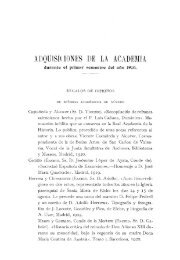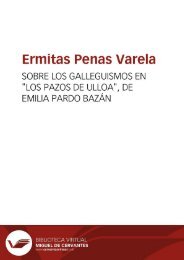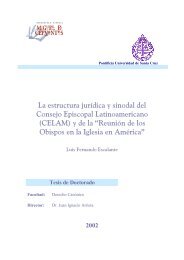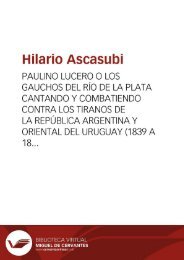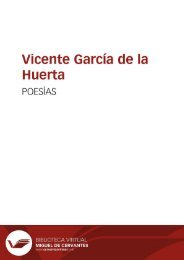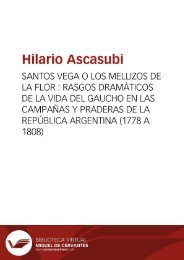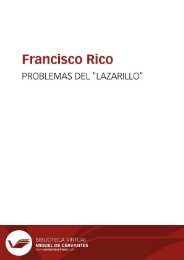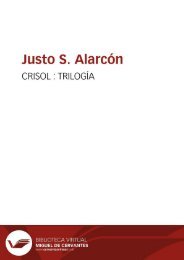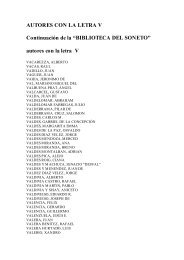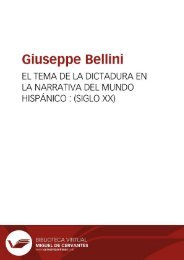You also want an ePaper? Increase the reach of your titles
YUMPU automatically turns print PDFs into web optimized ePapers that Google loves.
Anales galdosianos [Publicaciones periódicas]. Año XII, 1977<br />
de mis ojos...; hablo de los de la cara..., porque con los del espíritu bien claro te veo... » (p. 1599) The<br />
wise old Don Lope understands only too well the identity of Tristana's lover. She is, he tells Saturna,<br />
« enamorada de un hombre que no existe, porque no puede existir, porque si existiera, Saturna, sería<br />
Dios y Dios no se entretiene en venir al mundo para diversión de las muchachas. » (p. 1602)<br />
As if it were not already clear, the narrator makes the transformation explicit:<br />
El ser humano y perfecto que amó, construyéndolo ella misma con materiales tomados de la<br />
realidad, se había desvanecido, es cierto, con la reaparición de la persona que fue como génesis de<br />
aquella creación de la mente; pero el tipo, en su esencial e intachable belleza, subsistía vivo en el<br />
pensamiento de la joven inválida. Si algo pudo variar ésta en la manera de amarle, no menos varió en<br />
su cerebro aquella cifra de todas las perfecciones. Si antes era un hombre, luego fue Dios, el principio<br />
y fin de cuanto existía... Fue la mudanza del hombre en Dios tan completa al cabo de algún tiempo,<br />
que Tristana llegó a olvidarse del primer aspecto de su ideal, y no vio al fin más que el segundo, que<br />
era seguramente el definitivo.<br />
(p. 1610)<br />
The workings of the Ghostly Lover in the psyche of the individual woman often take the form<br />
of what Jung calls «the sacred conviction» 168 , strongly held values, ideas and opinions which<br />
are the motivating force of a woman's behavior in the real world and which somehow parallel the<br />
transformations of the Ghostly Lover himself.<br />
In Tristana, the «sacred conviction» takes the form of a desire for complete liberation from<br />
dependence on others, for total self-affirmation. It begins as a kind of vague restlessness, a still<br />
unformed desire arising from the subconscious. The narrator explains: « Anhelos indescifrables<br />
apuntaron en su alma. Se sentía inquieta, ambiciosa, sin saber de qué, de algo muy distante, muy alto,<br />
que no veían sus ojos por parte alguna... » (p. 1548) This vague desire is soon translated into an<br />
explicit expression of her desire for freedom and self-affirmation. In her conversation with Saturna,<br />
Tristana cries: « Yo quiero vivir, ver mundo y enterarme de por qué y para qué me han traído a esta<br />
tierra en que estamos. Yo quiero vivir y ser libre... » (p. 1549) In a subsequent letter to Horacio she<br />
complains: « El problema de mi vida me anonada más cuanto más pienso en él. Quiero ser algo en<br />
el mundo, cultivar un arte, vivir de mí misma. El desaliento me abruma. ¿Será verdad, Dios mío, que<br />
pretendo un imposible? » (p. 1580)<br />
168 M.-L. von Franz, op. cit. , p. 189.<br />
125





